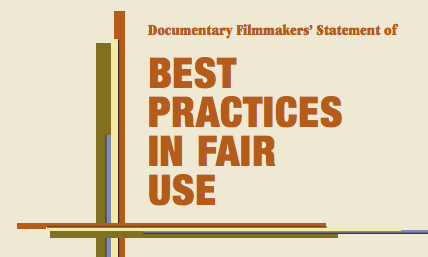
At the 2014 Getting Real Documentary Film Conference, hosted by the International Documentary Association, the Center is releasing new research on the embrace of fair use in the field.
Based on a survey of 489 documentary filmmakers by Patricia Aufderheide and Aram Sinnreich, the survey finds that a great majority of documentary filmmakers understand fair use, find it valuable in their work, and have had no trouble with acceptance by broadcasters, lawyers or insurers.
In 2005, the situation was opposite. Most filmmakers avoided fair use. If they did use it, insurers routinely excluded claims in errors and omissions insurance. That meant broadcasters wouldn’t take work that included fair use. All that has changed since the 2005 creation of the Documentary Filmmakers’ Statement of Best Practices in Fair Use.
Today, attitudes about fair use are positive, strongly associated with free expression and creative opportunity. 70% of those surveyed said they had at least a “good” understanding of fair use, and 75% felt that fair use is “absolutely necessary” or “very useful” to documentary filmmakers.
Fair use is also becoming more widely accepted within the business. Over half of those surveyed (60%) reported that they had recently employed fair use in a production, and almost all reported having no difficulty with insurance (99%) or broadcasters (95%) accepting fair use, as long as they had a letter from a lawyer attesting that the use was fair.
However, the study also found that the field lacks confidence, possibly because individual makers are unaware of general acceptance. Some filmmakers continue to modify their work, believing the environment to be riskier than it is. This self-censorship could be avoided with more education.
At the conference, Aufderheide is calling for the IDA, one of the original authors of the statement, to publicize the survey results and to celebrate its members’ roles in changing the field.
Look for more results at cmsimpact.org/documentary in January. As always, if you have your own fair use story, please let us know!
